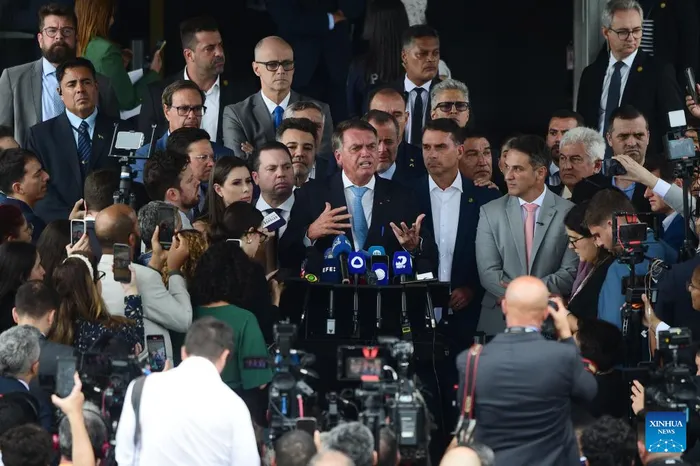BRICS+ Series: Bolsonaro’s 27-Year Prison Sentence: What It Means for the future of Brazil

Former Brazilian President Jair Bolsonaro (C) speaks to the media at the Federal Senate in Brasilia, Brazil, on March 26, 2025. Brazil's Supreme Court on Wednesday formally indicted former President Jair Bolsonaro and seven of his allies over an alleged plot to overturn the results of the 2022 presidential election.
Image: XINHUA
Brazil has entered uncharted territory with the Supreme Court sentencing former president Jair Bolsonaro to 27 years in prison for his role in plotting to overthrow the constitutional order. While Brazil has experienced numerous coup attempts since the end of the monarchy, this is the first time a leader of such an attempt has been convicted. The ruling signals a new chapter for Brazilian democracy, showing that even the most powerful political figures are not above the law.
For many observers, Bolsonaro’s conviction was expected. Evidence gathered during the investigation was extensive, ranging from digital communications to testimony from insiders, creating a case far stronger than previous examples of military or civilian interventions in Brazilian politics. The real surprise for some was that one justice voted for acquittal, highlighting how politically sensitive the case remains.
Political scientists such as Camila Rocha argue that Brazil’s democracy has matured since past military regimes. Justice Flávio Dino underscored this view by stressing that crimes undermining democracy, such as attempted coups, cannot be pardoned or protected by amnesty. Dino’s judgment rejected the possibility of Congress shielding Bolsonaro and his allies from prosecution, reinforcing the principle of accountability.
Despite his conviction, Bolsonaro retains a significant and highly mobilised support base. Analysts warn of possible unrest or violence by radical supporters in response to the court’s ruling. The public remains divided: while many Brazilians view the sentence as a necessary defence of democracy, others consider it political persecution. This polarisation mirrors trends seen elsewhere, including in the United States.
International Attention and the Road Ahead
The case attracted international attention, including critical remarks from foreign officials and political figures who compared Bolsonaro’s trial to ongoing investigations in other countries. Justice Dino dismissed the idea that foreign pressure or sanctions could sway Brazil’s judiciary, stating pointedly that “tweets” or political threats from abroad would not influence court decisions. This stance reflects Brazil’s growing confidence in its institutions and its refusal to allow outside interference.
Bolsonaro’s political future is uncertain. While his legal team plans to appeal, the scale of the conviction severely limits his chances of returning to office. Yet figures such as São Paulo governor Tarcísio de Freitas and Bolsonaro’s wife, Michelle Bolsonaro, are already seen as potential standard-bearers for his movement ahead of the 2026 elections. The sentencing may reshape but not necessarily extinguish Brazil’s populist right.
This ruling underscores a decisive shift in Brazil’s democratic resilience. By holding a former president accountable for attempting to subvert democratic norms, the Supreme Court has drawn a line in the sand, signalling to future leaders that power does not confer immunity. Whether this leads to greater stability or deeper political division will depend on how Brazil manages the aftermath of this unprecedented moment.
Written By:
*Dr Iqbal Survé
Past chairman of the BRICS Business Council and co-chairman of the BRICS Media Forum and the BRNN
*Cole Jackson
Lead Associate at BRICS+ Consulting Group
Chinese & South American Specialist
** MORE ARTICLES ON OUR WEBSITE https://bricscg.com/
** Follow https://x.com/brics_daily on X/Twitter for daily BRICS+ updates
Related Topics: